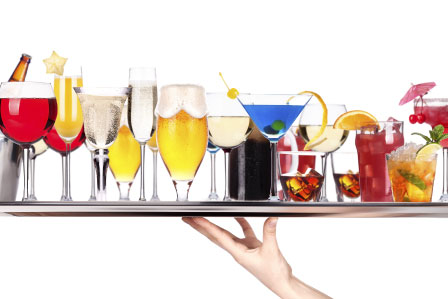Having diabetes does not prevent the consumption of alcoholic drinks, but there are some considerations:
- Alcohol can metabolized to produce energy and so has dietary consequences
- Alcohol promotes the uptake of blood glucose into liver glycogen causing a drop in Blood Glucose
- Many alcoholic drinks contain sugar, particularly mixed drinks
- The symptoms of drunkenness and hypoglycemia are similar – alcohol may mask the effects of hypoglycemia
- Diabetics must remain sober enough to care for themselves (perform injections on schedule, etc)
- Excess alcohol consumption can cause increased serum triglycerides
General Rules
- Simple drinks (wine, beer) are more reliable than complex mixed drinks, especially in company where you have less control over the contents or concentration.
- Drink with or after food to avoid hypo problems.
- Approach anything with caution if you are in doubt.
- Low alcohol beers are not necessarily preferred - many of them are rather sweet.
- Alcohol provides about 7 cal/g of food energy. Some is lost in the urine, but most is converted by the liver into forms which can be used for energy elsewhere in the body or stored as fat.
Acceptable in moderation:
- Red wines
- Dry or medium-dry white wines
- Dry sherries
- Dry light beers (lagers, light ales fermented with low residual sugar)
- Spirits (whiskey, gin, vodka, etc) with “diet” mixers
Extreme caution – high sugar content:
- Sweet wines or sherries
- Ports
- Heavy or dark sweetened beers (stout, porters, etc which have high residual sugar)
- Wine Coolers
- Spirits with normal mixers
- Cocktails
- Liqueurs
Extreme caution – high alcohol content:
- Neat (undiluted) spirits

